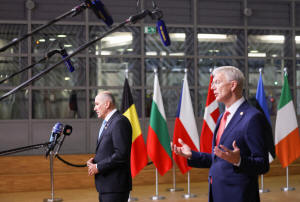EU leaders weigh new sanctions on Russia amid 'series of attacks'
 Send a link to a friend
Send a link to a friend
 [December 16, 2021]
By Philip Blenkinsop and Gabriela Baczynska [December 16, 2021]
By Philip Blenkinsop and Gabriela Baczynska
BRUSSELS (Reuters) -The European Union is
under assault from Russia on multiple fronts and must unite behind new
economic sanctions, Baltic and central European leaders said on
Thursday, with Lithuania citing a risk of possible Russian military
strikes from Belarus.
The warnings at an EU summit were some of the most direct in recent
weeks as the United States and its NATO allies seek to deter any
possible Russian attack on Ukraine and reduce Moscow's margin for
surprise. Many NATO allies are also EU member states.
"We really are facing a series of attacks. I see them all as
associated," Latvian Prime Minister Krisjanis Karins told reporters,
listing what he said was the weaponisation of Middle East migrants on
Belarus' borders with the EU, artificially high prices for Russian
natural gas, and Russian disinformation.
Ukraine remains the main flashpoint between Russia and the West.
Washington says Russia has amassed more than 100,000 troops on Ukraine's
borders, possibly for an invasion. Moscow says it has a right to move
its troops around its own territory as it sees fit but says the
manoeuvres are purely defensive.

EU leaders will warn of "massive consequences" if Russia were to invade
Ukraine, according to a draft final summit statement seen by Reuters.
The United States and Britain have taken a similar stance.
The Kremlin denies the West's accusations against it, including any plan
to invade Ukraine. It says it has legitimate security interests in the
region and on Wednesday handed proposals to the United States that NATO
should not expand eastwards or place new weapons systems near Russia's
borders.
Prime Minister Micheal Martin of Ireland, a neutral country outside
NATO, said any disputes with Moscow should be resolved by "peaceful
means".
'DANGEROUS SITUATION'
But Russia's Baltic neighbours attacked what they see as Moscow's
attempts to blur the line between peace and war.
"We are probably facing the most dangerous situation in the last 30
years, I am talking about not only Ukraine but the eastern flank of
NATO," said Lithuanian President Gitanas Nauseda, a day after EU leaders
held a summit with Ukraine and other former Soviet republics in
Brussels.
[to top of second column]
|

Slovenia's Prime Minister Janez Jansa and Latvia's Prime Minister
Arturs Krisjanis Karins Slovakia's Prime Minister Eduard Heger
arrive for an European Union Summit at the European Council building
in Brussels, Belgium December 16, 2021. Kenzo Tribouillard/Pool via
REUTERS

He cited fears that Russia might integrate Belarus, which borders
Poland and two Baltic states, into its military systems and use its
territory "as a possible platform to attack neighbouring countries".
Any coordinated EU sanctions will likely depend on Germany, whose
new centre-left chancellor Olaf Scholz has taken a tougher line than
his centre-right predecessor, Angela Merkel.
However Berlin would still be torn over whether to risk Russian
natural gas supplies to its businesses and households this winter by
standing up to Moscow, diplomats said.
Germany, France and Ukraine sought on Wednesday to revive the
"Normandy" format, a diplomatic peace initiative with Russia to end
a conflict in eastern Ukraine pitting pro-Russian separatists
against Kyiv's forces.
"We will underscore again that the inviolability of borders is an
important basis for peace in Europe, and that together we will do
everything to ensure that this inviolability endures," Scholz told
reporters at his first EU summit as German leader.
The West imposed economic sanctions on Russia in 2014 over its
annexation of the Crimean peninsula from Ukraine. The measures
targeted Russia's energy, banking and defence sectors.
Slovenian Prime Minister Janez Jansa suggested that one option for
the EU in its standoff with Moscow might be to prevent the new Nord
Stream 2 pipeline between Russia and Germany from becoming
operational.
(Reporting by Robin Emmott, Sabine Siebold, Kate Abnett, Jan
Strupczewski, Gabriela Baczynska, writing by Robin Emmott, editing
by John Chalmers)
[© 2021 Thomson Reuters. All rights
reserved.] Copyright 2021 Reuters. All rights reserved. This material may not be published,
broadcast, rewritten or redistributed.
Thompson Reuters is solely responsible for this content.
 |